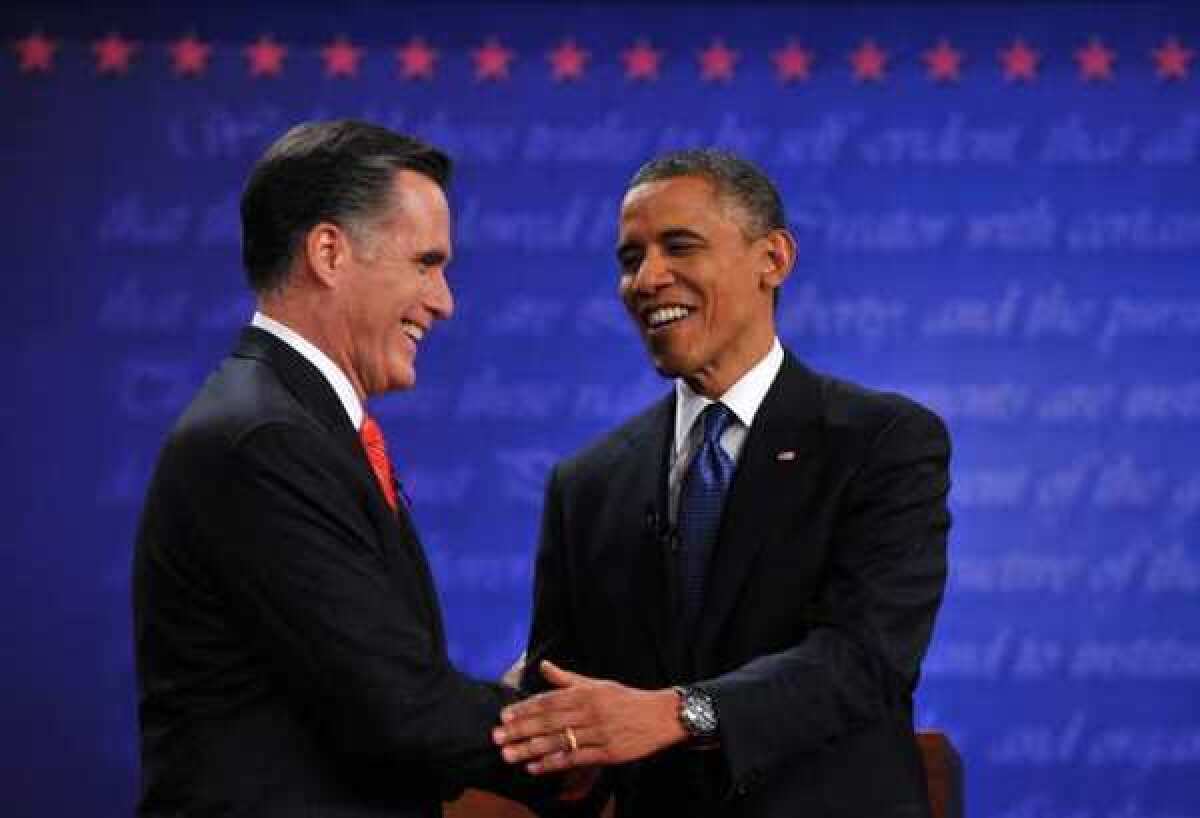McManus: What the undecided voters want

What do undecided voters want from presidential candidates, anyway?
Not much. Just clearer answers, a sense of firm leadership â and a credible promise that the next four years will bring more bipartisan cooperation than the last four.
âIâll vote for the person that gives me the most clarity,â Calvin Smith, 70, a retired high school teacher in Columbus, Ohio, said last week. âIâve heard enough visions. I want concrete, step-by-step instructions.â
PHOTOS: 2012 vice presidential debate
In a polarized election year, the dwindling ranks of undecided voters have become objects of wonderment and even ridicule. Polls report that only about 6% of the nationâs likely voters are still on the fence; another 12% or so have tentatively settled on a candidate but say they still might change their minds.
Some, like Smith, have been paying close attention all year, have watched the debates and know the candidatesâ positions well. Smith says heâs a moderate â âa fiscal conservative and a social liberalâ â whoâs dissatisfied with both presidential candidates. He wishes President Obama hadnât presided over so much growth in the federal deficit, but he wishes Mitt Romney werenât so conservative on social issues such as abortion and contraception.
DEBATE LOG: Vice Presidential Debate
âItâs a quandary,â he said cheerfully.
But he does plan to vote, and he thinks he knows how heâll make up his mind. âIn the end, itâs going to be who wins the next two debates,â he said.
Smith was one of 12 Ohio voters who spent an evening last week talking about the election in a focus group sponsored by the University of Pennsylvaniaâs Annenberg Public Policy Center. A focus group isnât a poll; itâs a discussion led by a public opinion scholar â in this case, Peter D. Hart, a leading Democratic pollster. The goal is to go beyond the two-dimensional questions that polls ask and get a sense of how voters weigh all the factors â emotional as well as analytical â in their choice.
The session was held in Columbus because itâs a swing city in an important swing state. The group included six men and six women, six who voted for Obama in 2008 and six who voted for his Republican opponent, Sen. John McCain. They werenât all âpure undecidedsâ â five said they leaned tentatively toward Obama, four toward Romney. Only three were completely on the fence.
But they shared some basic views: The country is in trouble, the economy isnât recovering fast enough, and neither presidential candidate has shown that he has the ability to turn things around.
For most of these voters, Obama has been a disappointment, but Romney hasnât convinced them that he understands middle-class concerns.
âObama, I think, hasnât done what he said he was going to do,â said Jeff Malesky, 54, a computer systems manager. âAnd Romney, we donât know what heâs going to do.â
Romney had impressed many of them with his performance in the first presidential debate Oct. 3 (the discussion took place before Thursdayâs vice presidential debate).
â[Romney] came out like a man who wanted the job with passion,â said Terry Grenier, 64, an advertising copywriter who had been leaning toward Obama. âIt made me feel a whole lot differently about himâŚ. I thought, âDamn! Iâm going to be listening with a different ear than I did before.â
If the choice were based on economics alone, Romney might have taken the night. About half of the participants said they thought Romney was more capable of fixing the economy, and about half said the two candidates were equally able â but no one argued that Obama had the advantage on the issue.
Why didnât that decide their votes? âThe presidency is more than just the economy,â replied Jessica Hall, 35, a homemaker.
A jumble of other issues were on their minds as well. Obamaâs healthcare plan guarantees insurance to people with preexisting conditions; if Romney repealed Obamacare, would the guarantee go away? Obamaâs had four years of on-the-job training; maybe four years wasnât enough time to give any president a chance to succeed, especially in an economic crisis.
And then there was the matter of Romneyâs wealth and his seemingly distant personality, factors that came up again and again during the two-hour conversation. âI donât think heâs relatable at all,â Hall said. When Hart asked the participants to say what family member the candidates reminded them of, Obama drew a variety of choices: father, uncle, brother-in-law. Romney, they said, seemed more like a stepfather.
Which one seems like the stronger leader? The answer seemed to be: neither. Obamaâs backbone, Grenier said, seemed made of âwillow.â Romneyâs backbone? âUnknown,â Smith replied.
Hart, who has presided over thousands of such sessions with voters since 1971, said the session helped clarify the presidential race â at least in Ohio, where polls suggest Obama is clinging to a narrow lead.
âThe economy is the central issue, but it isnât transformative for Romney,â Hart said. âTheyâre skeptical that either candidate can fix it.â
With only a little more than three weeks remaining in the campaign, the race remains too close to call. Many of those voters will be watching the two remaining debates between Obama and Romney. The conventional wisdom still holds that televised debates have only a marginal effect on a presidential election.
But this year, with the electorate so closely divided, even a marginal effect could be decisive.
Follow Doyle McManus on Twitter @DoyleMcManus
More to Read
A cure for the common opinion
Get thought-provoking perspectives with our weekly newsletter.
You may occasionally receive promotional content from the Los Angeles Times.











